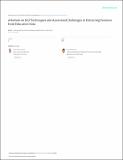| dc.description.abstract | There has been a significant increase in academic processes to ensure the quality of educational resources such as curricula,
examinations, and educational content. This has drawn attention to studies exploring the use of text mining, learning machines,
and auto-analytic tools like natural language processing (NLP) to interpret and evaluate the quality of these educational resources.
Auto-analytical techniques are required to evaluate the quality of educational content; otherwise, manual evaluation can be burdensome
and improperly influenced by human instincts. This study employs a methodical approach to comprehensively survey NLP techniques
for extracting syntactic and semantic features to analyze and comprehend educational content. NLP, in combination with machine
learning, is an ideal tool for automatically evaluating the aspects of higher education quality. This is because they include features
that aid in textual content comprehension as well as implementing natural language techniques that provide an interpretive interface
between humans and machines. The review highlights the limitations of NLP in evaluating educational data, including the need for
sentence-level understanding and the need for research to address challenges like noise in text data, domain-specific language variations,
and improving model robustness for effective feature extraction in educational contexts. The findings of this review hold substantial
benefits for various stakeholders, including education regulatory bodies, researchers, higher education institutions, and NLP researchers.
Notably, the study equips NLP researchers with valuable insights into document analysis’s current strengths and weaknesses. The
accumulated evidence can provide the skills to develop NLP-based applications for evaluating the relevant and quality aspects of
education in higher educational settings. Furthermore, NLP researchers can be updated on the strengths and limitations of document
analysis, allowing them to apply effective text representation approaches and implement the appropriate algorithm and techniques for
NLP tasks, particularly in educational data.
Keywords: NLP, syntactic features, semantic feat | en_US |

